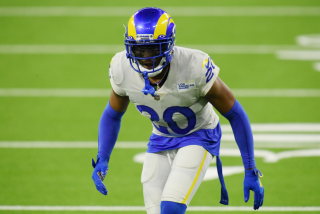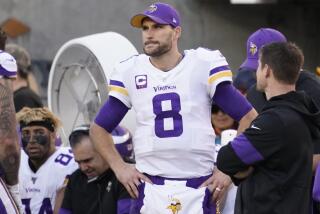NFL Meetings : Redskins’ Offer to Marshall Is the Main Topic
- Share via
PHOENIX — Wilber Marshall, who isn’t even here, was the most widely discussed individual Monday as the National Football League’s 28 franchise groups continued their annual meetings in the Valley of the Sun.
Marshall, 25, of the Chicago Bears, is one of the league’s finest linebackers. He is exactly what the defending champion Washington Redskins need to make a substantial improvement in a defense that was just good enough last season. And they have gone after him.
They have offered him a no-trade, $6-million contract, payable over the next five years--most of the money up front--the Bears have confirmed.
The contract is, of course, conditional on whether Marshall’s present employers approve. Under NFL rules, the Bears can either match it, paying Marshall the $6 million themselves, or they can take two Washington draft choices in trade--a No. 1 this spring and another No. 1 next year.
This is the first time since 1977 that any NFL franchise has bid on any other team’s free agent. And the question is what the Bears will do about it.
Their coach, Mike Ditka, hasn’t been answering questions in Phoenix. But the club’s director of administration, Bill McGrane, said: “We simply haven’t decided. The rules give us a week to consider it.”
Joe Robbie, president of the Miami Dolphins, expects to see Marshall in a Redskin uniform this fall.
“The Bears have two tough choices,” Robbie said. “They can lose Marshall, a proven All-Pro. Or they can keep him, pay him, and let their payroll structure get knocked clean out of balance.
“I really don’t see how they can afford to mess up their payroll that much. I fear they’ll have to let him go.”
For this and other reasons, most other NFL executives agree.
“No player is worth two No. 1s,” said Detroit lawyer Jerry Vainisi, the former Chicago general manager who helped build the 1986 champion Bears.
The NFL consensus is that the Redskins chose precisely the right time and team to break the NFL’s 11-year free-agent stalemate.
First, their owner, Jack Kent Cooke, is a billionaire.
Second, Bear owners Edward and Michael McCaskey, though millionaires, don’t have the kind of resources that would enable them to move the salaries of other players up to $1 million or more. They paid Walter Payton that much, but nobody else, not even quarterback Jim McMahon, who led them to their Super Bowl title.
“They’d have to move Mike Singletary and others into the million-dollar club,” said Dick Steinberg, New England Patriots director of player development.
Third, the Redskins will be drafting last this spring.
“Their No. 1 choice is like a No. 2,” said Hugh Culverhouse, president of the Tampa Bay Buccaneers.
And, fourth, to the Redskins, Marshall probably is one of the few NFL players really worth two high first draft choices.
“The (Redskin) team is pretty well set as it is,” Culverhouse said. “If I had a team in place, I’d make that kind of deal.
“But unlike the Redskins, most of us are rebuilding, and you need all your choices when you’re a rebuilding team.”
In Culverhouse’s opinion, Washington’s coach, Joe Gibbs, and the club’s general manager, Bobby Beathard, have shrewdly maneuvered to bargain for the one player--Marshall--they could legitimately expect to make an instant impact. He and others made these points:
--The Redskins, as they demonstrated when beating the Denver Broncos in the Super Bowl Jan. 31, are powerful at defensive end with Charles Mann and Dexter Manley.
--What they need most is a fast, young, gifted linebacker to help Mann and Manley rush the passer. Or, alternatively, to help their secondary in pass coverage.
As Gibbs said, “(Marshall) fits right into our (defensive) scheme.”
According to Culverhouse, one reason Marshall will be there to fit in is Beathard’s foresight in giving him a no-trade contract.
“That will discourage the Bears,” Culverhouse said. “It would discourage most teams. Five-year no-trade contracts are very tricky.”
Reportedly, the contract for Marshall, who was the Bears’ first draft choice from Florida in 1984, is also guaranteed against injury.
Asked why the Redskins decided to break the free-agent logjam, Gibbs said: “We’ve been very aggressive against the (United States Football League) and anyone else to get talent.”
To name just one recent coup, the Redskins brought in quarterback Doug Williams as a free agent when Beathard outbid the few other general managers who were interested. Williams later led Washington to the Super Bowl title.
Beathard, moreover, has often given up high choices for experienced talent.
“(The Redskins) still value veterans above (drafted) rookies,” said former Washington coach George Allen. “They’re continuing the policy we started.”
Said Steinberg: “It makes a lot of sense to trade draft choices for real talent, this year particularly. This isn’t a very good draft year.”
Another NFL executive who asked that his name not be used said: “I can just see Gibbs and Beathard sitting down after the Super Bowl to discuss the one new acquisition who would help them the most--and where they could most likely get him.
“Jack Cooke goes along with anything Gibbs and Beathard agree on, no matter what it costs. Jack believes in those two guys completely, and he has the money to do what they want. And he’s 100% committed to winning.
“That’s the combination that makes the Redskins so hard to beat. Let them get by with this Marshall deal, and we’ll all pay for it.”
If Marshall changes clubs, he will be the first NFL free agent to move since defensive back Norm Thompson shifted from St. Louis to Baltimore in 1977.
“This shows the . . . NFL players that the system works,” Bronco president Patrick D. Bowlen said.
Oh, really? Once every decade?
NFL Notes
When the Redskins go into training camp this summer, Joe Gibbs said the new starter in their one-back offense will be Tim Smith, a star of the Super Bowl game. A surprise starter that day in San Diego, Smith became the first runner in the 22-year history of the Super Bowl to exceed 200 yards. . . . In Monday’s meetings, the owners made no decisions, and they made no announcements afterward. They spent their time contemplating their problems.
Commissioner Pete Rozelle said it was a West Coast federal appeals court that breathed new life into the NFL’s case against the Raiders. Although the jurists had previously awarded the Raiders $11 million--tripling to $33 million under antitrust rules, “The appeals court said we can take as an offset the (hypothetical losses) from the expansion opportunity we lost” in the Los Angeles Coliseum. For this reason, Rozelle said, the NFL will also seek an indemnity from the St. Louis Cardinals. By moving here, the Cardinals have presumably cost the NFL an expansion site in Phoenix. Some NFL owners are reasoning that if they can get $11 million from the Cardinals, matching the $11 million they have only technically lost to the Raiders, they will wind up having to pay the Raiders nothing.
Miami Coach Don Shula, a member of the four-man competition committee, clarified the NFL’s controversial grasp-and-control rule. “If a defensive player has both hands around the quarterback, it’s grasp and control--and a sack,” he said. “Usually, one hand isn’t enough--unless the hand is around the quarterback’s head or neck.” . . . Dallas Cowboys president Tex Schramm, chairman of the competition committee, said the members are in favor of continuing instant replay officiating--but only by a 3-1 margin.
More to Read
Go beyond the scoreboard
Get the latest on L.A.'s teams in the daily Sports Report newsletter.
You may occasionally receive promotional content from the Los Angeles Times.










